February, 2019
now browsing by month
EBA and the Grand Plan to Return back to Cambodia of Sam Rainsy
Op-Ed: Sam Rainsy Facebook Page
១២ កុម្ភៈ ២០១៩ / 12 February 2019 – Cambodia’s Exiled Opposition Vows Return to Create Democratic Change (*)
សារព័ត៌មានអន្តរជាតិ The Geopolitics (ភូមិសាស្ត្រនយោបាយ) ទើបតែចុះផ្សាយអត្ថបទមួយរបស់លោក សម រង្សុី មានចំណងជើង “ថ្នាក់ដឹកនាំគណបក្សប្រឆាំងកំពុងនិរទេស ប្តេជ្ញាវិលត្រឡប់មកកម្ពុជាវិញ ដើម្បីជម្រុញឲ្យមានការផ្លាស់ប្តូរ តាមបែបបទប្រជាធិបតេយ្យ”។
ខ្លឹមសារសង្ខេប នៃអត្ថបទនេះ
១- ល្បែងនយោបាយរបស់ ហ៊ុន សែន និងរបបគាត់ ជិតដល់ទីបញ្ចប់របស់វាហើយ ដោយសារតែប្រជារាស្ត្រខ្មែរ ចង់សម្រេចវាសនារបស់ខ្លួនដោយខ្លួនឯង។
២- ជ័យជំនះគណបក្សប្រជាជនកម្ពុជា ក្នុងការបោះឆ្នោតខែកក្កដា ២០១៨ គឺជាជ័យជំនះក្លែងក្លាយ ក្នុងការបោះឆ្នោតក្លែងក្លាយ ពីព្រោះមិនមានវត្តមានគណបក្សសង្គ្រោះជាតិ។
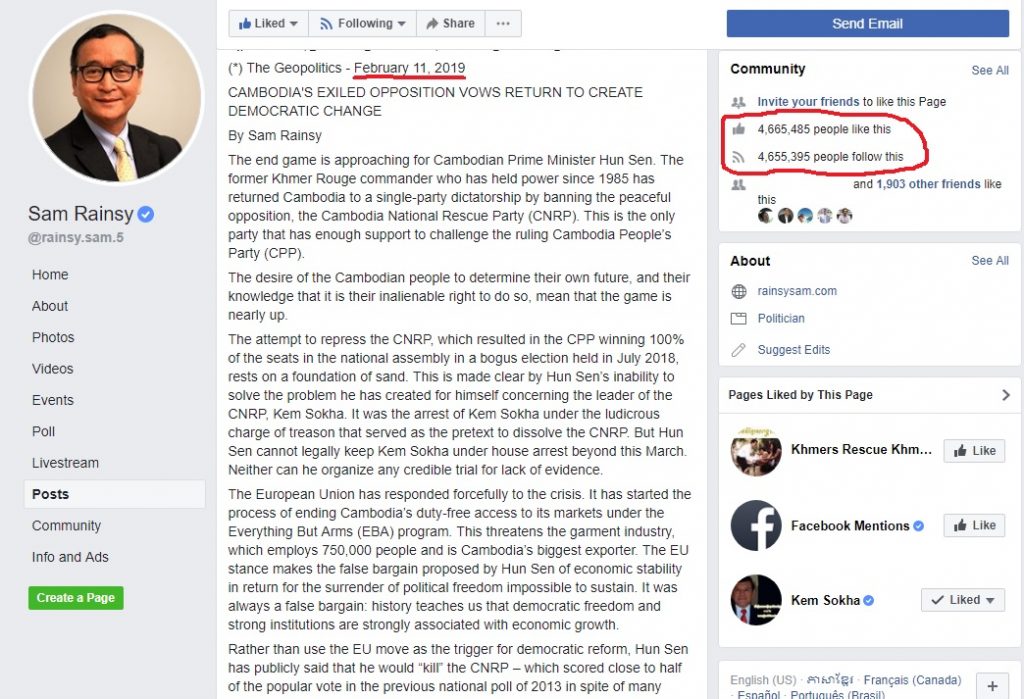
៣- ហ៊ុន សែន បានចោទប្រកាន់យ៉ាងងងើលប្រធានគណបក្សសង្គ្រោះជាតិ លោក កឹម សុខា ពីបទក្បត់ជាតិ ហើយបានយកការចោទប្រកាន់នេះ ធ្វើជាលេសដើម្បី រំលាយគណបក្សសង្គ្រោះជាតិ។ តែមតិជាតិ និងអន្តរជាតិ មិនជឿ ហ៊ុន សែន ទេ ហើយយើងដឹងថា តាមផ្លូវច្បាប់ ហ៊ុន សែន ត្រូវតែដោះលែង កឹម សុខា នៅដើមខែមីនានេះ ពីព្រោះគាត់មិនអាចរកភស្តុតាងត្រឹមត្រូវណាមួយ ដើម្បីកាត់ទោស កឹម សុខា បានឡើយ។
៤- ហ៊ុន សែន គួរណាស់យកការគំរាមដាក់ទណ្ឌកម្មពីសហភាពអឺរ៉ុប ធ្វើជាមូលដ្ឋានដើម្បីធ្វើការកែទម្រង់តាមបែបបទប្រជាធិបតេយ្យ តែគាត់បែរមកគំរាមកម្ចាត់គណបក្សសង្គ្រោះជាតិទៅវិញ បើសហភាពអឺរ៉ុបអនុវត្តទណ្ឌកម្មនោះមែន។ នេះបង្ហាញថា ហ៊ុន សែន ជាជនផ្តាច់ការដ៏ព្រៃផ្សៃ។
៥- ហ៊ុន សែន ចាប់ប្រជារាស្ត្រខ្មែរ ធ្វើជាចំណាប់ខ្មាំង ដើម្បីគំរាមសហគមន៍អន្តរជាតិ កុំឲ្យដាក់ទណ្ឌកម្មលើរបបគាត់ ដោយសារតែអំពើពុករលួយ និងការរំលោភសិទ្ធិមនុស្ស ក្រោមរបបគាត់។ គាត់មិនញញើត បង្ខំប្រជារាស្ត្រ ឲ្យទទួលទណ្ឌកម្មជំនួសគាត់ និងដោយសារគាត់។ នេះបង្ហាញថា ហ៊ុន សែន ជាមនុស្សកំសាក ដែលមិនហ៊ានទទួលខុសត្រូវខ្លួនឯង។
៦- ហ៊ុន សែន ចង់នៅក្រាញអំណាចជារៀងរហូត ទោះបីប្រជារាស្ត្រខ្មែរវេទនាយ៉ាងណាក៏ដោយ ហើយប្រទេសជាតិហិនហោចយ៉ាងណាក៏ដោយ។ ហ៊ុន សែន ចង់រក្សាអំណាច ដើម្បីរក្សានិទណ្ឌភាព (ការរួចទោស) សម្រាប់គាត់ ពីព្រោះពេលណាគាត់បាត់អំណាច គាត់នឹងប្រឈមការកាត់ទោស ចំពោះមុខតុលាការឯករាជ្យណាមួយ ពីបទឧក្រិដ្ឋជាច្រើន ដែលគាត់បានប្រព្រឹត្តរយៈពេលជាង ៣០ ឆ្នាំកន្លងមក។
៧- តាមការដាក់ចំណាត់ថ្នាក់ របស់អង្គការតម្លាភាពអន្តរជាតិ (Transparency International) ប្រទេសកម្ពុជា ក្រោមរបប ហ៊ុន សែន បានធ្លាក់ទៅក្នុងចំណោមប្រទេសដែលពុករលួយជាងគេក្នុងពិភពលោក និងក្នុងចំណោម ប្រទេសដែលរងការបំផ្លាញធ្ងន់ធ្ងរជាងគេ ដោយសារតែអំពើពុករលួយនេះ។
៨- យើងមិនអាចអត់ទ្រាំនៅស្ងៀមបានទេ ចំពោះមុខស្ថានការណ៍បែបនេះ។ ថ្នាក់ដឹកនាំគណបក្សសង្គ្រោះជាតិ ដែលកំពុងនិរទេសសព្វថ្ងៃ មានទាំងរូបខ្ញុំ (សម រង្ស៊ី) ផងដែរ បានសម្រេចចិត្តថានឹងវិលត្រឡប់ មកប្រទេសកម្ពុជាវិញ ក្នុងឆ្នាំ ២០១៩ នេះ។ យើងអំពាវនាវដល់សហគមន៍អន្តរជាតិ ឲ្យបន្តដាក់សម្ពាធលើរបប ហ៊ុន សែន។ ទោះបីមាតុភូមិនិវត្តន៍របស់យើង ប្រកបដោយហានិភ័យសម្រាប់រូបយើងយ៉ាងណាក៏ដោយ ក៏យើងត្រូវតែជួយប្រជារាស្ត្រខ្មែរ ឲ្យសម្រេចបាននូវគោលបំណងរបស់លោក ក្នុងនោះមានការដោះលែងលោក កឹម សុខា និងការបើកផ្លូវឲ្យគណបក្សសង្គ្រោះជាតិដំណើរការឡើងវិញ។ ជាចុងក្រោយ ត្រូវតែមានការបោះឆ្នោតឡើងវិញឲ្យបានពិតប្រាកដ និងត្រឹមត្រូវ ដើម្បីឲ្យប្រជារាស្ត្រខ្មែរ អាចជ្រើសរើសមេដឹកនាំដែលលោកចង់បានពិតប្រាកដ។
៩- របបផ្តាច់ការ ហ៊ុន សែន សព្វថ្ងៃ រំលោភទាំងរដ្ឋធម្មនុញ្ញនៃប្រទេសកម្ពុជា ទាំងកិច្ចព្រមព្រៀងទីក្រុងប៉ារីស ឆ្នាំ ១៩៩១។ របប ហ៊ុន សែន នេះ មិនមែនគ្រាន់តែជាគ្រោះថ្នាក់សម្រាប់ប្រទេសកម្ពុជាតែឯងទេ តែជាគ្រោះថ្នាក់សម្រាប់ពិភពលោកទាំងមូល។
១០- សហគមន៍អន្តរជាតិ ត្រូវតែរក្សាជំហរម៉ឺងម៉ាត់ ក្នុងការដាក់ទណ្ឌកម្មលើរបប ហ៊ុន សែន ហើយត្រូវតែប្រើឥទ្ធិពលរបស់ខ្លួនយ៉ាងពេញទំហឹង ដើម្បីជួយការពារសុវត្ថិភាពថ្នាក់ដឹកនាំគណបក្សសង្គ្រោះជាតិ ពេលធ្វើមាតុភូមិនិវត្តន៍។ អ្នកប្រជាធិបតេយ្យក្នុងពិភពលោកទាំងអស់ ត្រូវតែរួមកម្លាំងគ្នា ដើម្បីជួយសង្គ្រោះប្រជារាស្ត្រខ្មែរ ដែលរងទុក្ខវេទនា ក្រោមរបប ហ៊ុន សែន ច្រើនទសវត្សរ៍មកហើយ។
(*) The Geopolitics – February 11, 2019
CAMBODIA’S EXILED OPPOSITION VOWS RETURN TO CREATE DEMOCRATIC CHANGE
By Sam Rainsy
The end game is approaching for Cambodian Prime Minister Hun Sen. The former Khmer Rouge commander who has held power since 1985 has returned Cambodia to a single-party dictatorship by banning the peaceful opposition, the Cambodia National Rescue Party (CNRP). This is the only party that has enough support to challenge the ruling Cambodia People’s Party (CPP).
The desire of the Cambodian people to determine their own future, and their knowledge that it is their inalienable right to do so, mean that the game is nearly up.
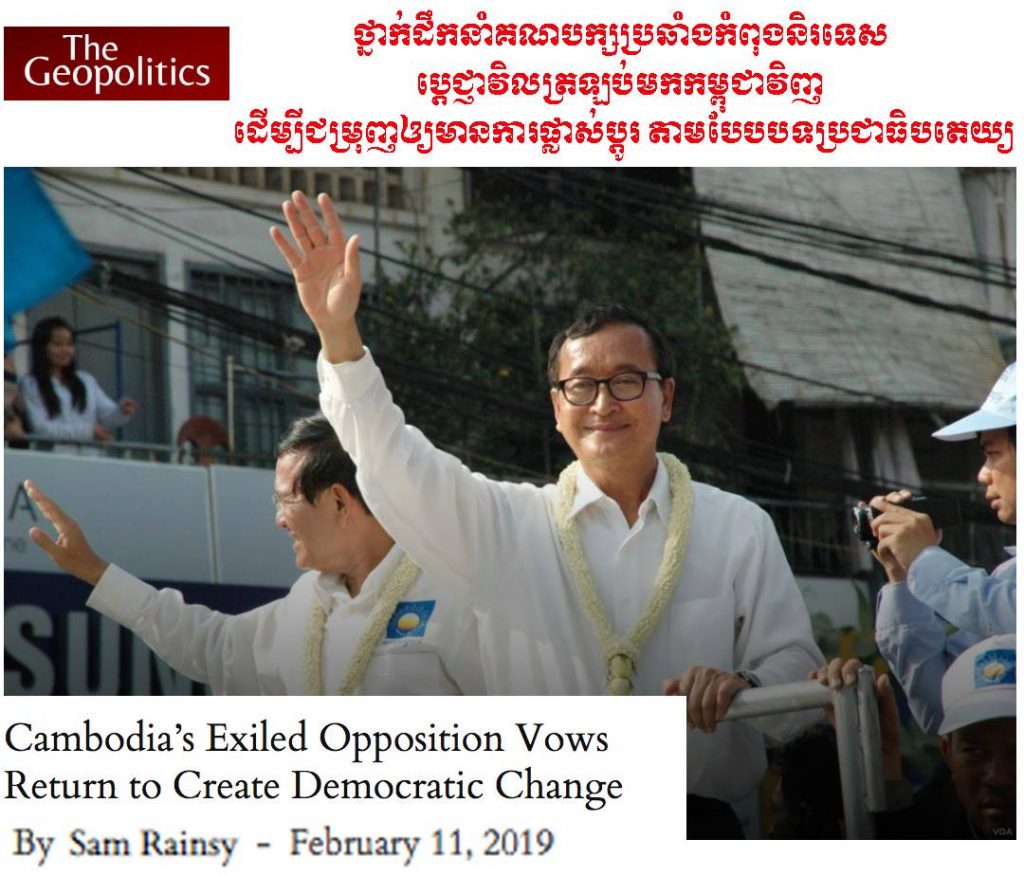
The attempt to repress the CNRP, which resulted in the CPP winning 100% of the seats in the national assembly in a bogus election held in July 2018, rests on a foundation of sand. This is made clear by Hun Sen’s inability to solve the problem he has created for himself concerning the leader of the CNRP, Kem Sokha. It was the arrest of Kem Sokha under the ludicrous charge of treason that served as the pretext to dissolve the CNRP. But Hun Sen cannot legally keep Kem Sokha under house arrest beyond this March. Neither can he organize any credible trial for lack of evidence.
Read More …Cambodia: EU launches procedure to temporarily suspend trade preferences
| Op-Ed: European Commission – Press release |
Comment: នីតិវិធីដកកិច្ចអនុគ្រោះពន្ធEBAនេះគឺចាប់ផ្តើមមានឥទ្ធិពលតាំងពីសារព្រមានដំបូងរបស់លោកស្រីម៉ាលស្ត្រមម្លេះពីព្រោះជាចិត្តសាស្ត្រពាណិជ្ជកម្ម ពាណិជ្ជករមានការអល់អែកក្នុងការបន្តាក់ទុននិងពង្រីកទុនរបស់ខ្លួននៅប្រទេសកម្ពុជារួចទៅហើយ។ ពាក្យពេជ្រតំណាងអោយសហគមអុឺរ៉ុបគឺអាចយកជាការបាននិងមិនមែនជាប្រជាភិថុតិដូចទំលាប់មេដឹកនាំខ្មែរបានធ្វើកន្លងមកនោះទេ។ ពាណិជ្ជករមានភាពមុឺងម៉ាត់ណាស់ចំពោះបញ្ហានេះ។ អ្វីដែលអាភ័ព្វនោះគឺលោកហ៊ុន-សែនដែលបានធ្វើនយោបាយប្រជាសាកលនិយមឬប្រជាភិថុតិជាមួយកម្មករកន្លងមក កំពុងរុញច្រានអោយកម្មករកាត់ដេរខ្មែរជិតមួយលាននាក់ធ្លាក់ខ្លួនក្រដើម្បីដោះដូរជាមួយនឹងការរក្សាអំណាចរបស់បុរសខ្លាំងកម្ពុជាតែប៉ុណ្ណោះ។ ជាការកត់សំគាល់ លោកហ៊ុន-សែនកំពុងតែស្ថិតនៅឯកោឯកាម្នាក់ឯងបន្តិចម្តងៗ។ គាត់ឯកោឯកាពីសមាជិកអ្នកស្រឡាញ់ជាតិពិតប្រាកដក្នុងជួរគណបក្សរបស់គាត់ គាត់ឯកោឯកាពីសហគមអន្តរជាតិមានសហរដ្ឋអាមេរិកជាដើម គាត់ឯកោឯកាពីប្រទេសជិតខាងរបស់កម្ពុជាមានថៃនិងវៀតណាមក៏ដូចជាសមាគមអាស៊ានជាដើម។ល។និង។ល។
Cambodia: EU launches procedure to temporarily suspend trade preferences
Brussels, 11 February 2019
The EU has today started the process that could lead to the temporary suspension of Cambodia’s preferential access to the EU market under the Everything But Arms (EBA) trade scheme. EBA preferences can be removed if beneficiary countries fail to respect core human rights and labour rights.
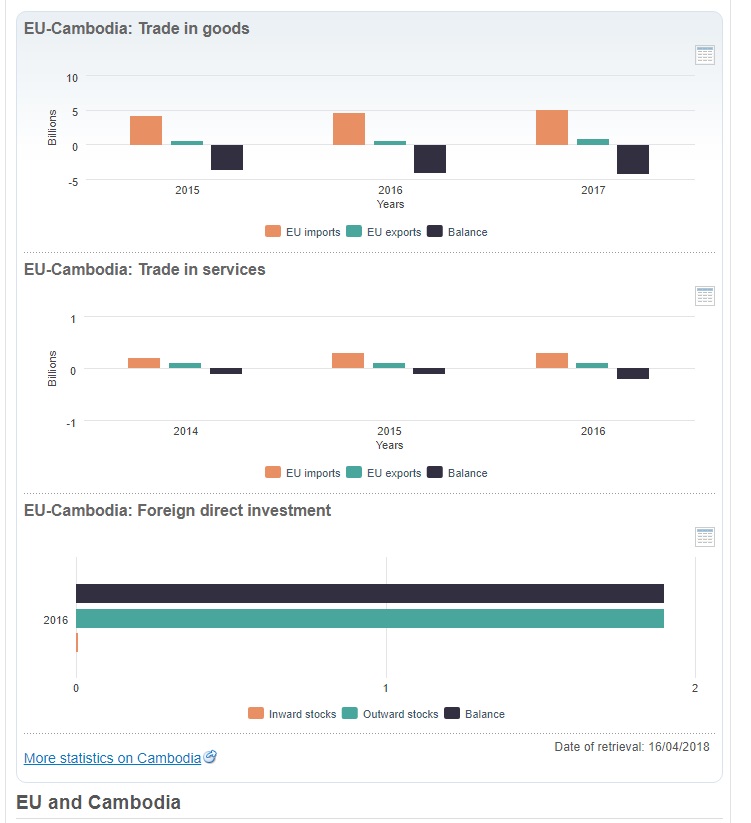
Launching the temporary withdrawal procedure does not entail an immediate removal of tariff preferences, which would be the option of last resort. Instead, it kicks off a period of intensive monitoring and engagement. The aim of the Commission’s action remains to improve the situation for the people on the ground.
High Representative for Foreign Affairs and Vice President of the European Commission Federica Mogherini said: “Over the last eighteen months, we have seen the deterioration of democracy, respect for human rights and the rule of law in Cambodia. In February 2018, the EU Foreign Affairs Ministers made clear how seriously the EU views these developments. In recent months, the Cambodian authorities have taken a number of positive steps, including the release of political figures, civil society activists and journalists and addressing some of the restrictions on civil society and trade union activities.However, without more conclusive action from the government, the situation on the ground calls Cambodia’s participation in the EBA scheme into question. As the European Union, we are committed to a partnership with Cambodia that delivers for the Cambodian people. Our support for democracy and human rights in the country is at the heart of this partnership.”
EU Commissioner for Trade Cecilia Malmström said: “It should be clear that today’s move is neither a final decision nor the end of the process. But the clock is now officially ticking and we need to see real action soon. We now go into a monitoring and evaluation process in which we are ready to engage fully with the Cambodian authorities and work with them to find a way forward. When we say that the EU’s trade policy is based on values, these are not just empty words. We are proud to be one of the world’s most open markets for least developed countries and the evidence shows that exporting to the EU Single Market can give a huge boost to their economies. Nevertheless, in return we ask that these countries respect certain core principles. Our engagement with the situation in Cambodia has led us to conclude that there are severe deficiencies when it comes to human rights and labour rights in Cambodia that the government needs to tackle if it wants to keep its country’s privileged access to our market.”
Following a period of enhanced engagement, including a fact-finding mission to Cambodia in July 2018 and subsequent bilateral meetings at the highest level, the Commission has concluded that there is evidence of serious and systematic violations of core human rights and labour rights in Cambodia, in particular of the rights to political participation as well as of the freedoms of assembly, expression and association. These findings add to the longstanding EU concerns about the lack of workers’ rights and disputes linked to economic land concessions in the country.
Today’s decision will be published in the EU Official Journal on 12 February, kicking off a process that aims to arrive at a situation in which Cambodia is in line with its obligations under the core UN and ILO Conventions:
– a six-month period of intensive monitoring and engagement with the Cambodian authorities;
– followed by another three-month period for the EU to produce a report based on the findings;
– after a total of twelve months, the Commission will conclude the procedure with a final decision on whether or not to withdraw tariff preferences; it is also at this stage that the Commission will decide the scope and duration of the withdrawal. Any withdrawal would come into effect after a further six-month period.
High Representative/Vice-President Mogherini and Commissioner Malmström launched the internal process to initiate this procedure on 4 October 2018. Member States gave their approval to the Commission proposal to launch the withdrawal procedure at the end of January 2019.
Background
The Everything But Arms arrangement is one arm of the EU’s Generalised Scheme of Preferences (GSP), which allows vulnerable developing countries to pay fewer or no duties on exports to the EU, giving them vital access to the EU market and contributing to their growth. The EBA scheme unilaterally grants duty-free and quota-free access to the European Union for all products (except arms and ammunition) for the world’s Least Developed Countries, as defined by the United Nations. The GSP Regulation provides that trade preferences may be suspended in case of “serious and systematic violation of principles” laid down in the human rights and labour rights Conventions listed in Annex VIII of the Regulation.
Exports of textiles and footwear, prepared foodstuffs and vegetable products (rice) and bicycles represented 97% of Cambodia’s overall exports to the EU in 2018. Out of the total exports of € 4.9bn, 99% (€ 4.8bn) were eligible to EBA preferential duties.
For More Information
MEMO: EU triggers procedure to temporarily suspend trade preferences for Cambodia
Generalised Scheme of Preferences
===========
EU starts process to hit Cambodia with trade sanctions
Op-Ed: Reuters
BRUSSELS, Feb 11 (Reuters) – The European Union started on Monday an 18-month process to end Cambodia’s preferential trade access to the bloc over its record on human and labour rights and democracy.
The European Commission, which coordinates trade policy for the 28-member EU, said that its decision would be published in the EU official journal on Feb. 12, triggering a countdown that would run until August 2020.
Read More …Freedom house rated Cambodia is “no free” country under Hun Sen leadership
Cambodian prime minister Hun Sen cemented his grip on power with lopsided general elections that came after authorities dissolved the main opposition party and shuttered independent media outlets. The military and police openly campaigned for the ruling party, which won all the seats in the legislature.
នាយករដ្ឋមន្ត្រីកម្ពុជាលោកហ៊ុន-សែនចាក់គ្រឹះអំណាចរបស់គាត់តាមរយៈការបោះឆ្នោតជាតិដែលខ្វះធម្មានុរូបច្បាប់ដែលបានប្រព្រឹត្តឡើងបន្ទាប់ពីអាជ្ញាធររំលាយគណបក្សជំទាស់ដ៏សំខាន់និងបិទប្រព័ន្ធផ្សព្វផ្សាយឯករាជ្យ។ មន្ត្រីយោធានិងប៉ូលីសបើកយុទ្ធនាការគាំទ្រគណបក្សគ្រប់គ្រងអំណាចយ៉ាងចំហរដែលគណបក្សនេះបានឈ្នះកៅអីសភាទាំងអស់តែម្តង។
Op-Ed: Key Developments by Freedom House Report 2019
Read more news on VOA in Khmer Language, and VOA in English
KEY DEVELOPMENTS IN 2018:
- The CPP won every seat in the lower house, the National Assembly, in July elections. The polls were held amid a period of repression that began in earnest in 2017, and saw the banning of the main opposition party, opposition leaders jailed or forced into exile, and remaining major independent media outlets reined in or closed. The CPP also dominated elections for the upper house, or Senate, held in February, taking every elected seat.
- The Phnom Penh Post, regarded by many observers as the last remaining independent media outlet in Cambodia, was taken over by a Malaysian businessman with links to Hun Sen.
- A Cambodian court sentenced an Australian filmmaker to six years in jail on charges of espionage. He had been arrested after denouncing rights abuses and filming political rallies.
- In November, the UN-assisted court known as the Khmer Rouge Tribunal found Nuon Chea and Khieu Samphan, two surviving leaders of the Khmer Rouge, guilty of genocide and crimes against humanity. The verdict for the first time legally defined the Khmer Rouge’s crimes as genocide.
OVERVIEW:
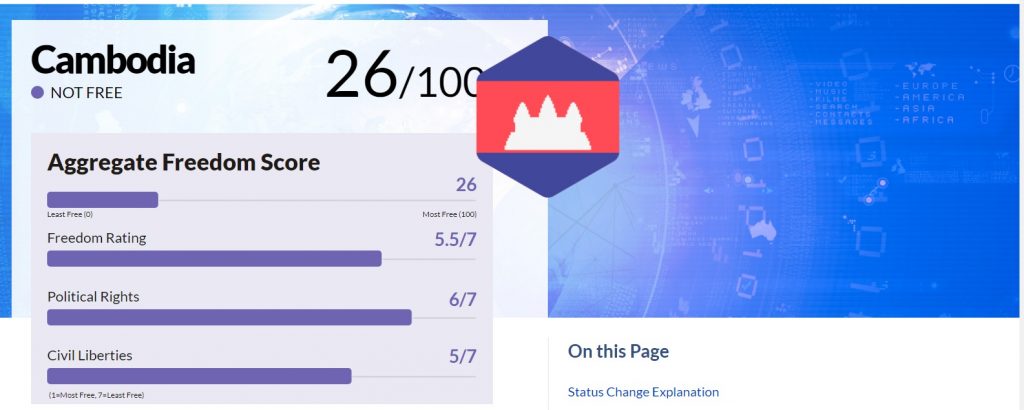
Cambodia’s political system has been dominated by Prime Minister Hun Sen and his Cambodian People’s Party (CPP) for more than three decades. The country has conducted semicompetitive elections in the past, but the 2018 polls were held in a severely repressive environment that offered voters no meaningful choice. The main opposition party was banned, opposition leaders were in jail or exiled, and independent media and civil society outlets were curtailed. The CPP won every seat in the lower house for the first time since the end of the Cambodian Civil War, as well as every elected seat in the upper house in indirect elections held earlier in the year. Political Rights and Civil Liberties:
POLITICAL RIGHTS: 6 / 40 (–4)
A. ELECTORAL PROCESS: 1 / 12 (–3)
A1. Was the current head of government or other chief national authority elected through free and fair elections? 0 / 4 (–1)
King Norodom Sihamoni is chief of state, but has little political power. The prime minister is head of government, and is appointed by the monarch from among the majority coalition or party in parliament following legislative elections. Hun Sen first became prime minister in 1985. He was nominated most recently after 2018 National Assembly polls, which offered voters no meaningful choice. Most international observation groups were not present due to the highly restrictive nature of the contest.
Score Change: The score declined from 1 to 0 because the incumbent prime minister was unanimously confirmed for another term after parliamentary elections that offered voters no meaningful choice.
A2. Were the current national legislative representatives elected through free and fair elections? 0 / 4 (–1)
The bicameral parliament consists of the 62-seat Senate and the 125-seat National Assembly. Members of parliament and local councilors indirectly elect 58 senators, and the king and National Assembly each appoint 2. Senators serve six-year terms, while National Assembly members are directly elected to five-year terms.
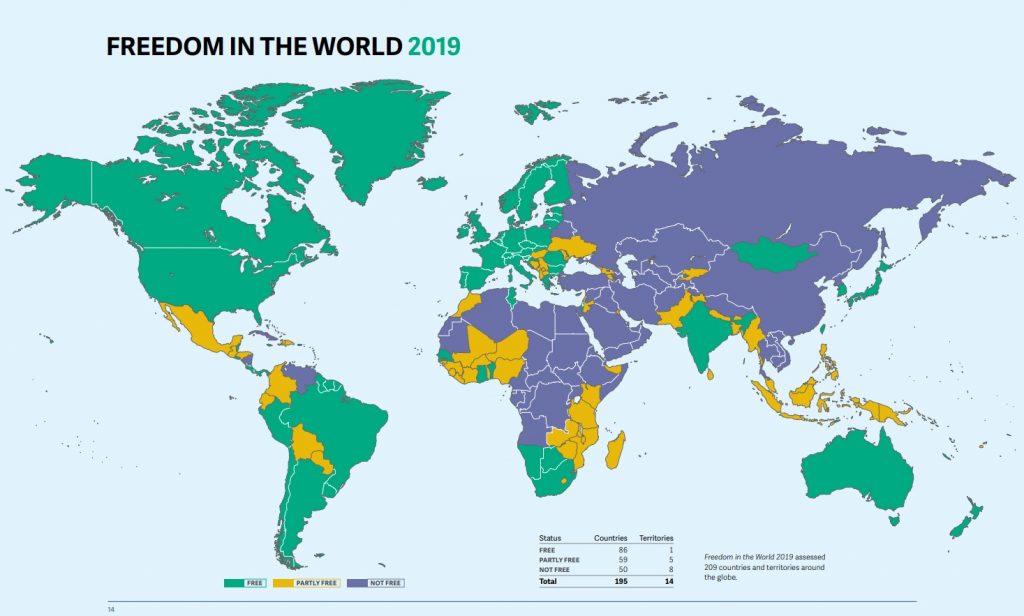
In 2018, the CPP won every seat in both chambers in elections that were considered neither free nor fair by established international observers, which declined to monitor them. In the months before the polls, the Supreme Court had banned the main opposition Cambodia National Rescue Party (CNRP) and jailed many of its members, and closed media outlets and intimidated journalists to the extent that there was almost no independent reporting on the campaign or the polls. Several small, obscure new “opposition parties” ran candidates in the lower house elections, though many of the parties were widely believed to have been manufactured to suggest multiparty competition. Following calls for an election boycott by former CNRP leaders, Hun Sen repeatedly warned that people who did not vote in the election could be punished. The election was condemned by many democracies. The United States responded by imposing targeted sanctions on Cambodian leaders, while the EU threatened to roll back a preferential trade agreement.
Score Change: The score declined from 1 to 0 because the parliamentary elections took place in a highly repressive environment that offered voters no meaningful choice, and produced a one-party legislature.
A3. Are the electoral laws and framework fair, and are they implemented impartially by the relevant election management bodies? 1 / 4 (–1)
In 2015, Cambodia passed two new election laws that permit security forces to take part in campaigns, punish parties that boycott parliament, and mandate a shorter campaign period of 21 days. The laws have been broadly enforced.
Voting is tied to a citizen’s permanent resident status in a village, township, or urban district, and this status cannot be changed easily. In 2017, an amendment to the electoral law banned political parties from association with anyone convicted of a criminal offense.
The National Election Committee (NEC) was reformed in 2013, but the CPP has since asserted complete control over its nine seats. Criminal charges were brought against the body’s one independent member in 2016, who was then jailed and removed from the body. The four NEC members affiliated with the CNRP resigned following the party’s 2017 dissolution. In 2018, the NEC sought to aid the CPP’s campaign by threatening to prosecute any figures that urged an election boycott, and informing voters via text message that criticism of the CPP was prohibited.
Read More …US, China Face Off Over Legacy in Cambodia
US, China Face Off Over Legacy in Cambodia
“China supported the Khmer Rouge during the 1970-1975 war and was the sole critical supporter throughout the 1975-1979 Democratic Kampuchea period of genocide. With Chinese money and support, Pol Pot carried out the period of murder, starvation and brutality.” – Said Elizabeth Beckerចិនគាំទ្រខ្មែរក្រហមក្នុងកំឡុងសង្គ្រាមឆ្នាំ១៩៧០-១៩៧៥ ហើយជាអ្នកគាំទ្រសំខាន់តែមួយគត់ក្នុងរវាងឆ្នាំ១៩៧៥-១៩៧៩នៃរបបប្រលៃពូជសាសន៌កម្ពុជាប្រជាធិបតេយ្យ។ ជាមួយថវិការនិងការគាំទ្ររបស់ចិន ប៉ុល-ពតប្រតិបត្តិការវាលពិឃាត ទុរភិកអត់ឃ្លាន និងឃោរឃៅព្រៃផ្សៃ។ – ដោយអេលីសាបុិត បែកខើរ
Op-Ed: VOA Khmer
February 09, 2019 10:40 PM
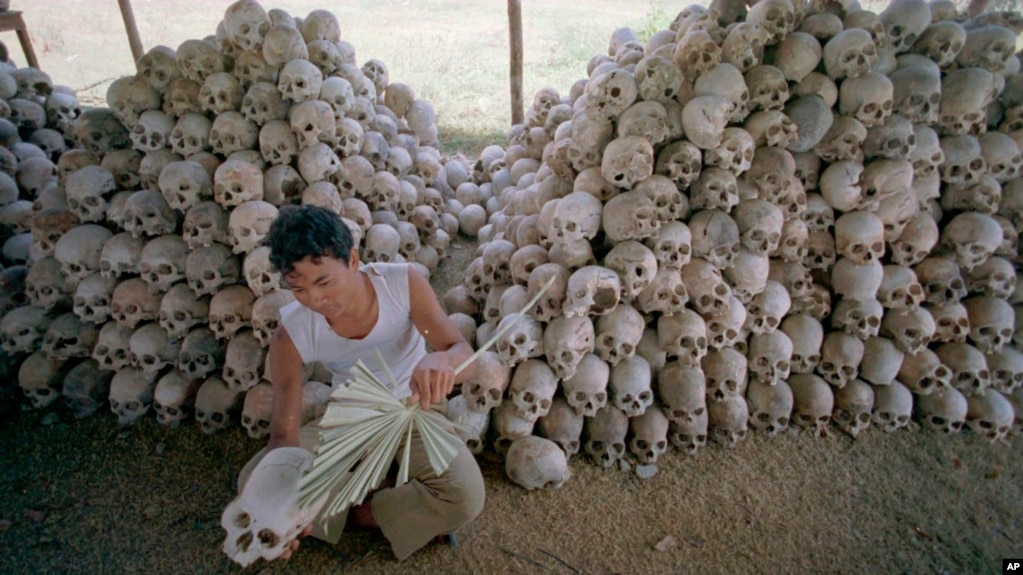
PHNOM PENH, CAMBODIA —
Almost half a century ago, the U.S.-backed Gen. Lon Nol led a coup in March 1970, overthrowing Cambodia’s King Norodom Sihanouk while the monarch visited Moscow.
Sihanouk took refuge in Beijing until 1975, when brutal Khmer Rouge guerrillas leading a resistance movement against Lon Nol’s Khmer Republic captured Phnom Penh on April 17 and took over the country.
Sihanouk initially supported the Khmer Rouge regime and was installed as head of state by the communists but resigned in 1976. He spent the rest of the regime as a de facto prisoner of the Khmer Rouge, which wreaked havoc on the country, killing or starving to death an estimated 1.7 million people from 1975 to 1979.
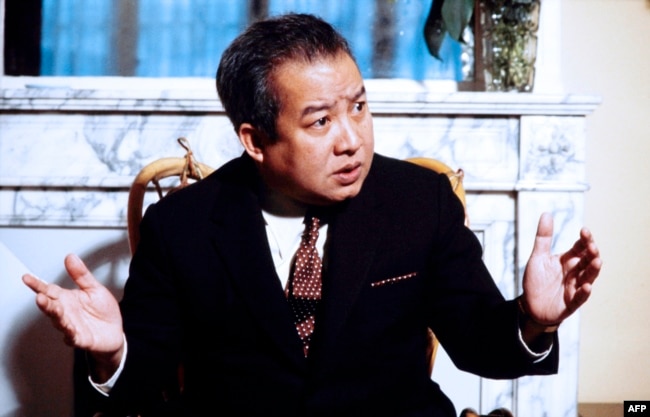
Echoes of the Cold War
Today, that sequence of events reverberates in a diplomatic face-off in Phnom Penh that echoes the Cold War even as it has gone viral in Cambodia. The online skirmish began when the U.S. Embassy posted a statement on its Facebook page, Jan. 30, saying the Khmer Rouge “ignorantly depended on a superpower,” an apparent reference to China. The embassy later issued comments claiming Washington was not involved in the coup led by Lon Nol that ousted Sihanouk.
“Instead, there is a lot of evidence showing that [the] Chinese government actively supported [the] Khmer Rouge from 1975 to 1979 and after that,” read a post by the U.S. Embassy.
In response, the Chinese Embassy posted a statement on its Facebook page, Feb. 1, mocking the idea that the coup “was not related to the U.S., but the CIA.”
Elizabeth Becker, author of When the War was Over: Cambodia and the Khmer Rouge Revolution, said the current tit-for-tat was “a distorted argument started by the Hun Sen government.”
“The subject is too serious for these propaganda potshots,” she wrote VOA Khmer in an email. “Both China and the U.S. have blood on their hands.”
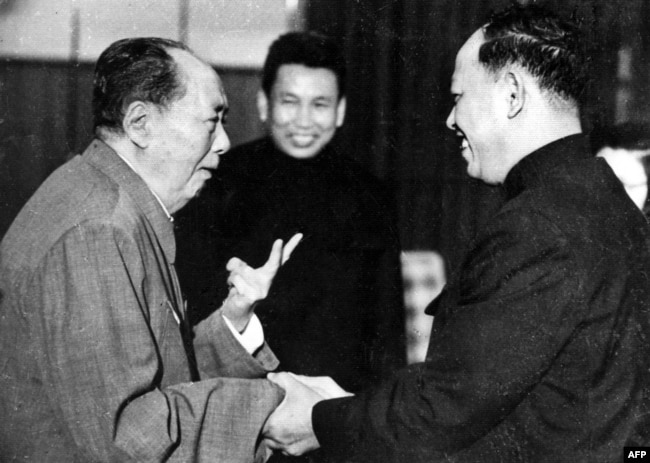
War of words
Chheang Vannarith, president of the Asian Vision Institute (AVI), an independent think tank based in Phnom Penh, said the current war of words is another indication that the U.S.-China competition in Cambodia will continue to intensify.
“I think Cambodia has become the proxy of U.S.-China geopolitical rivalry,” he said in an email. “The winner writes history. It is … real politics.”
Meas Nee, a political analyst who holds a doctorate in sociology and international social work from La Trobe University in Melbourne, Australia, said Cambodia should be cautious of falling into a trap if a new Cold War emerges.
“Those two superpowers can take advantage” of a vulnerable country like Cambodia, he said, adding that Phnom Penh’s closeness with Beijing makes it unlikely to take a stand. China is Cambodia’s largest aid donor.
Although many consider the U.S. involvement to be a matter of historical record, Emily Zeeberg, U.S. Embassy spokeswoman, told VOA Khmer that there was “no evidence that the United States was involved in the coup that brought Lon Nol to power.”
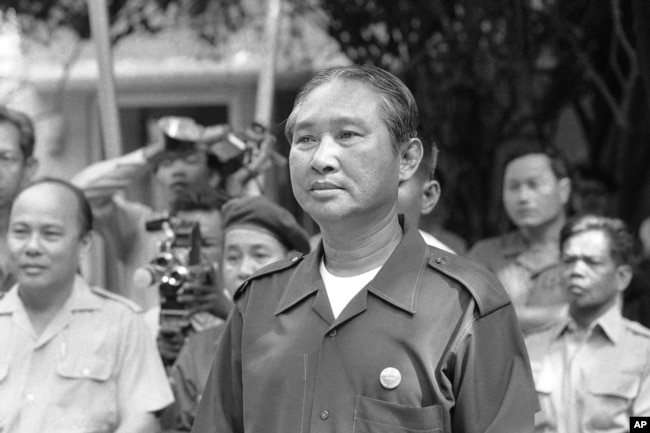
“The United States has addressed its war legacy by long-standing and substantial efforts for humanitarian demining and removing unexploded ordnance (UXO), including the removal of hundreds of thousands of Chinese-made mines, which have injured and killed people for decades,” she said in an email.
“We hope the Chinese government will acknowledge its legacy in Cambodia and make amends to all the Cambodians its policies affected,” Zeeberg added.
Repeated efforts to reach the Chinese Embassy in Cambodia were unsuccessful.
Phay Siphan, a Cambodian government spokesman, could not be reached for comment.
Cambodia’s Ministry of National Defense said in a statement issued last week that Cambodia had suffered from a civil war that arose from “a coup supported by United States in 1970.”
“Cambodia doesn’t want to see the same history, as Cambodia has full peace,” it read.
‘Supporting the Khmer Rouge’
Sophal Ear, associate professor of diplomacy and world affairs at Occidental College at Los Angeles, said: “It looks like the U.S. Embassy simply reminded Cambodia of who was supporting the Khmer Rouge at their height of power-1975-1979.”
“Indeed, with the withdrawal of the U.S., the Khmer Republic collapsed,” he added.
Read More …










